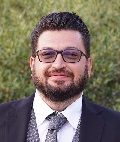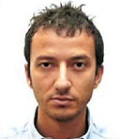 |
Federico Boschetti graduated in Classics at the University “Ca’ Foscari” of Venice in 1998. He got his PhD in Classical Philology jointly at the University of Trento and the University of Lille III in 2005 (thesis: “Essay of computer-assisted linguistic and stylistic analyses of the Aeschylus’ Persae”). He also got a PhD in Cognitive and Brain Sciences – Language, Interaction and Computation at the University of Trento in 2010 (thesis: “A Corpus-based Approach to Philological Issues”). Since 2011 he has been a researcher at the Institute of Computational Linguistics “A. Zampolli” of the CNR of Pisa (CNR-ILC). Currently he works at the detached research unit of the CNR-ILC close of the Venice Centre for Digital and Public Humanities (VeDPH) of the University Ca’ Foscari in Venice. His research interests are: Digital Philology, Collaborative and Cooperative Philology, Historical OCR and Distributional Semantics applied to ancient texts. |
 |
Vittore Casarosa graduated in Electronic Engineering at the University of Pisa and spent a few years at a research center of the Italian National Research Council, doing research on “Electronic Computers” (that center is today ISTI, the Institute for Science and Technology in Informatics). He then joined IBM, spending many years in the R&D laboratories of IBM in Italy, France and in the US, doing and managing research mostly in image processing and networking. Since 2000 he is Senior Research Associate of the Italian National Research Council at ISTI, where he is associated with the activities of the Multimedia Laboratory in the field of Digital Libraries; from 2000 to 2007 he has been Deputy Director of DELOS, the Network of Excellence on Digital Libraries. Vittore has been teaching at the University of Pisa (Department of Engineering), at the University of Parma (Department of Philosophy) and at the Open University of Bolzano (department of Computer Science). Presently he is teaching a course on Digital Libraries at the University of Pisa (department of Digital Humanities). |
 |
Paolo Cignoni got a permanent researcher position at IEI-CNR in 1996, a PhD in Computer Science at the University of Pisa in 1998, Senior Researcher in 2001 at ISTI-CNR, Research Director in 2010 and since April 2019 he leads the Visual Computing Lab. His main research interests include Geometry Processing, Digital Fabrication and 3D Scanning and Cultural Heritage. He has been engaged in several international and national research projects, mainly in the fields of Cultural Heritage and Computer Aided Medicine, dealing with multiresolution data modelling and rendering, 3D scanning, surface reconstruction, interactive graphics and virtual reality, scientific visualization, volume rendering. He has published more than 150 papers in international journals and conferences. He is a Fellow of the Eurographics Association, is a member of the editorial boards of the main journals in Visualization and Computer Graphics, and teaches a course on Data Visualization at the University of Pisa. Go to Web site |
 |
Augusto Ciuffoletti graduated in Computer Science in 1980 with a thesis on distributed fault-tolerant systems. Since 1988 he has been a researcher at the Department of Computer Science at the University of Pisa, where he is currently teaching computer networks at the Course of Studies in Digital Humanities. He is presently collaborating with the Open Cloud Computing Interface (OCCI) working group of the OGF, and he is an academic member of the Distributed Management Task Force (DMTF). In 2016 he was a Guest Lecturer at the Cloud Computing Summer School at the ZHAW in Zurich. He has been associated with the Italian Institute of Nuclear Physics (INFN-CNAF, Bologna) from 2001 to 2010 for Grid and Cloud related projects (DataGrid, CoreGrid, OGF Europe). He has been a visiting scientist at the International Computer Science Institute in Berkeley, at the University of South Florida, and at the IBM T.J.Watson Center in Yorktown Heights. His research interests focus on the design principles and the monitoring of distributed infrastructures. Go to Web site |
 |
Claudio Loconsole received his B.S. and M.S. cum laude in Computer Science Engineering respectively from Politecnico di Bari, Italy, in 2007 and Politecnico di Torino, Italy, in 2009. In 2012, he received the Ph.D. cum laude in Innovative Technologies from Scuola Superiore Sant’Anna, Pisa, Italy. He is a former Post-Doc Research Fellow at Perceptual Robotics (PERCRO) laboratory, TeCIP Institute, Scuola Superiore Sant’Anna and a former Assistant Professor at Department of Electrical and Information Engineering (DEI), Politecnico di Bari. In 2012, he spent a semester as Visiting Ph.D. student at Universidade do Porto (Portugal). He is currently a teacher of Computer Science in High Schools. He has been awarded with several international acknowledgments and prizes such as the first prize winner at “World Simulink Student Challenge” in 2011; the “Europe Future of Health Award” in 2012; the ETIC Prize (AICA-Rotary) for his Ph.D. thesis in 2013; the Tech Disruption Prize at the Global Impact Competition Italia in 2014; the second prize winner at “Start Cup Toscana” in 2013 and in 2016. He is an invited member at AUDI Innovative Thinking community (2015). His research interests include digital tools for documentary heritage, human-machine and human-robot interaction, assistive technologies, computer vision, motion planning and neurorehabilitation. |
 |
Marco Potenziani is presently a researcher at the Visual Computing Lab of ISTI-CNR in Pisa. He got a Master of Engineering from the University of Siena and a PhD in Computer Science from the University of Pisa. ), Marco Potenziani holds the position Specialized in Computer Graphics, his research interests range from interactive visualization of complex 2D/3D data to web publishing of high-resolution digital content. He has participated in several national and international research projects aimed at Data Publishing, Scientific Visualization, and Digital Humanities. Since 2019 he teaches a course on “3D Graphics for Cultural Heritage” at the University of Pisa, collaborates with the international journal “ACM Journal on Computing and Cultural Heritage”, for which he holds the position of Associate Editor, and participates as CNR expert in the evaluation of projects submitted to the FCS call of the Italian Ministry of Economic Development (MiSE). |
 |
Seamus Ross is Professor in the Faculty of Information at the University of Toronto and served as Dean for seven years (2009-2015). During 2015 and 2016 he served as Interim Director of the Marshall McLuhan Centre for Culture and Technology. Before joining Toronto, he was Professor of Humanities Informatics and Digital Curation and Founding Director of HATII (Humanities Advanced Technology and Information Institute) at the University of Glasgow (1997-2009). He served as Associate Director of the Digital Curation Centre in the U.K. (2004-2009) and was Principal Director of ERPANET (2001-2004) and Digital Preservation Europe (DPE) (2006-2009). He has been principal investigator in a number of international projects, such as the DELOS Digital Libraries Network of Excellence (2004-2007), Planets (2006-2010), and Digicult Forum (2002-2004). His main research interests are in the fields of Digital Preservation and Curation, Digital Humanities, digitization, digital repositories, emulation, digital archaeology, semantic extraction and genre classification, cultural heritage informatics and knowledge representation and reasoning. He is the author of a number of papers published in international journal, such as studies of “Digital Archaeology” and forensic storage formats, examination of digital preservation and archival science, and introduction to digital preservation. He also promotes broadening access to scholarship and was instrumental in the creation of the Digiman Animation Series by DigitalPreservationEurope (e.g., 2009 video Digital Preservation and Nuclear Disaster: An Animation ). Go to Web site |
 |
Enrica Salvatori is Associated Professor in the Department of Civilization and Knowledge of at the University of Pisa, where she teaches Medieval History, History of Late Ancient and Medieval Settlements and Digital Public History. Vice President of the degree course in Informatica Umanistica (Digital Humanities) at the same University from 2006 to 2010; Visiting Professor at the University P. Valéry (Montpellier, France) in 2006, 2008, 2011 and 2015; from 2015 to 2021 Director of the Laboratorio di Cultura Digitale (LabCD, Digital Culture Laboratory – http://labcd.humnet.unipi.it/) and now scientific manager of the Multimedial Service of the University of Pisa. Previously in the board of AIUCD (Italian Association of Digital Culture; 2015-2021), she is now in the board of AIPH (Italian Association of Public History 2017-..) and of PHW (Public History Weekly). Her research interests are focused on Medieval History and Digital Humanities, in mutual connection. Much of his work has been on the medieval Mediterranean circulation, the evolution of the municipality in Italy and Provence and the history of Lunigiana (northern Tuscany), as well as the study of the Digital Public History as a discipline. In particular, she has led since 2011 a research team on the history and archeology of the landscape in Val di Vara and Lunigiana (http://tramonti.labcd.unipi.it/) and since 2014 the digital edition of the Pelavicino Code (http://pelavicino.labcd.unipi.it/), structured as a Digital Public History project. |
 |
Nicoletta Salvatori graduated in Pisa in Philosophy of Science. Since 1985 she is a professional journalist, member of the Ugis (association of Italian scientific journalists). She was editor in chief of the monthly naturalistic magazine Airone, creator and chief editor of the monthly scientific magazine Quark, editorial chief in Domus Publishing Co. (Tuttoturismo, Meridiani and Meridiani Montagna), editor in Chief of Arte Navale magazine, about yachting and seafaring culture. She is editor in chief of Umanistica Digitale, the journal of the Italian Association of Digital Humanities (AIUCD – Associazione per l’Informatica Umanistica e la Cultura Digitale). Nicoletta has written several books and ebooks. She works as an editorial consultant at the communication agency Hole in One in Milano, and at the Simonelli electronic publishing Co. She teaches editing, new media and communication at the University of Pisa (Informatica Umanistica). |

